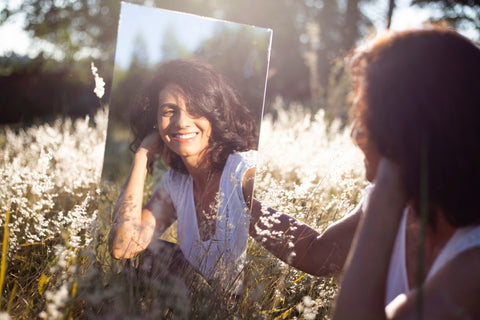It used to be that we'd scroll through magazines and admire the gorgeous models, their perfect glowing skin, taut thighs with no trace of cellulite, hips free of stretch marks. However, even the models themselves didn't actually look like that; they were all photoshopped to look so 'perfect'.
Before smartphones, social media and endless face filters, the only people who had access to such photo editing effects were professional models, actors and celebrities who had highly paid photographers touch up their photos for magazines and newspapers.
Nowadays, many people have the Facetune app on their phone and all kinds of beauty filters on every social media platform. Photo editing is no longer rare and for the elite, everyone has access!

We carry our phones around with us all day, scrolling while we wait at the grocery store or at the school pick-up line. We go on Instagram and compare ourselves to fitness gurus with tiny waists and juicy bums, or mommy influencers who somehow never have dark circles under their eyes or messy hair.
The issue is, much of the photo editing and photo filters are so convincing, they're hard to detect, so we compare ourselves to an illusion. And because we don't measure up, we use editing apps to compensate, thus the cycle continues.

The spookiest thing is that you can now download video editing apps which will edit your body in real time. Yes, you can make your waist look thinner, tummy flatter, legs longer... in a video! I (Michele) was curious and downloaded an app to try this out. It's insane, it's so convincing! So even if your favorite Instagram model posts a video of herself looking 'perfect' in her bikini on her romantic vacation with her husband, just remember, even that can be edited!
Some larger companies are signing 'no Photoshop' pledges and allowing the model's stretch marks, bulges and discolorations to show in all their glory. Such companies include Dove, Target and Aerie. They are also using models of different ethnicities and body types. This is definitely a step in the right direction.

So how can we counteract these images we see everywhere? Curate. Curate your online experiences very carefully. Pay attention to how you feel when you're online. Unfollow anyone who gives you even a slight twinge of low self-esteem or comparison envy. Search hashtags like #BodyPositivity to find influencers who reject a narrow view of beauty. Follow women of all shapes and sizes, who are not afraid to show their imperfections and who celebrate women's beauty in all its glorious shapes and sizes.

